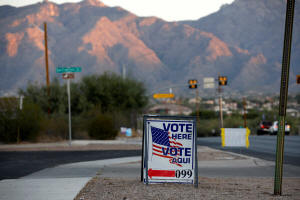U.S. Supreme Court mulls power of landmark law in major voting rights
case
 Send a link to a friend
Send a link to a friend
 [March 02, 2021]
By Andrew Chung and Lawrence Hurley [March 02, 2021]
By Andrew Chung and Lawrence Hurley
WASHINGTON (Reuters) - U.S. Supreme Court
justices on Tuesday will consider whether to uphold two
Republican-backed voting restrictions in Arizona in a case that could
further weaken the Voting Rights Act, a landmark 1965 federal law that
barred racial discrimination in voting.
The important voting rights case comes before the justices at a time
when Republicans in numerous states are pursuing new restrictions after
former President Donald Trump made false claims of widespread fraud in
the Nov. 3 election that he lost to Democratic President Joe Biden.
The justices will hear arguments in appeals by Arizona's Republican
Attorney General Mark Brnovich and the state Republican Party of a lower
court ruling that found that the voting restrictions at issue
disproportionately burdened Black, Hispanic and Native American voters.

One of the measures made it a crime to provide another person's
completed early ballot to election officials, with the exception of
family members or caregivers. The other disqualified ballots cast
in-person at a precinct other than the one to which a voter has been
assigned.
Community activists sometimes engage in ballot collection to facilitate
voting and increase voter turnout. The practice, which critics call
"ballot harvesting," is legal in most states, with varying limitations.
Voting rights advocates said voters sometimes inadvertently cast ballots
at the wrong precinct, with the assigned polling place sometimes not the
one closest to a voter's home.
A broad ruling by high court, whose 6-3 conservative majority includes
three justices appointed by Trump, endorsing the restrictions could
impair the Voting Rights Act by making it harder to prove violations.
Such a ruling could impact the 2022 mid-term elections in which
Republicans are trying to regain control of the U.S. House of
Representatives and Senate.
[to top of second column]
|

Sign directs voters to a polling station on Election Day in Tucson,
Arizona, U.S. November 3, 2020. REUTERS/Cheney Orr/File Photo

A ruling is due by the end of June.
At issue in the Arizona case is the Voting Rights Act's Section 2,
which bans any rule that results in voting discrimination "on
account of race or color." This provision has been the main tool
used to show that voting curbs discriminate against minorities since
the court in 2013 gutted another section of the statute that
determined which states with a history of racial discrimination
needed federal approval to change voting laws.
The Democratic National Committee and the Arizona Democratic Party
sued to try to overturn the restrictions. The San Francisco-based
9th U.S. Circuit Court of Appeals last year found Arizona's
restrictions violated the Voting Rights Act, though they remained in
effect for the Nov. 3 election.
The 9th Circuit also found that "false, race-based claims of ballot
collection fraud" were used to convince Arizona legislators to enact
that restriction with discriminatory intent, violating the U.S.
Constitution's prohibition on denying voting rights based on race.

Republicans have argued that new voting restrictions are needed to
combat fraud. Numerous courts rejected claims of voting fraud made
in lawsuits by Trump and his allies seeking to overturn his loss to
Biden.
(Reporting by Andrew Chung; Editing by Will Dunham)
[© 2021 Thomson Reuters. All rights
reserved.] Copyright 2021 Reuters. All rights reserved. This material may not be published,
broadcast, rewritten or redistributed.
Thompson Reuters is solely responsible for this content. |